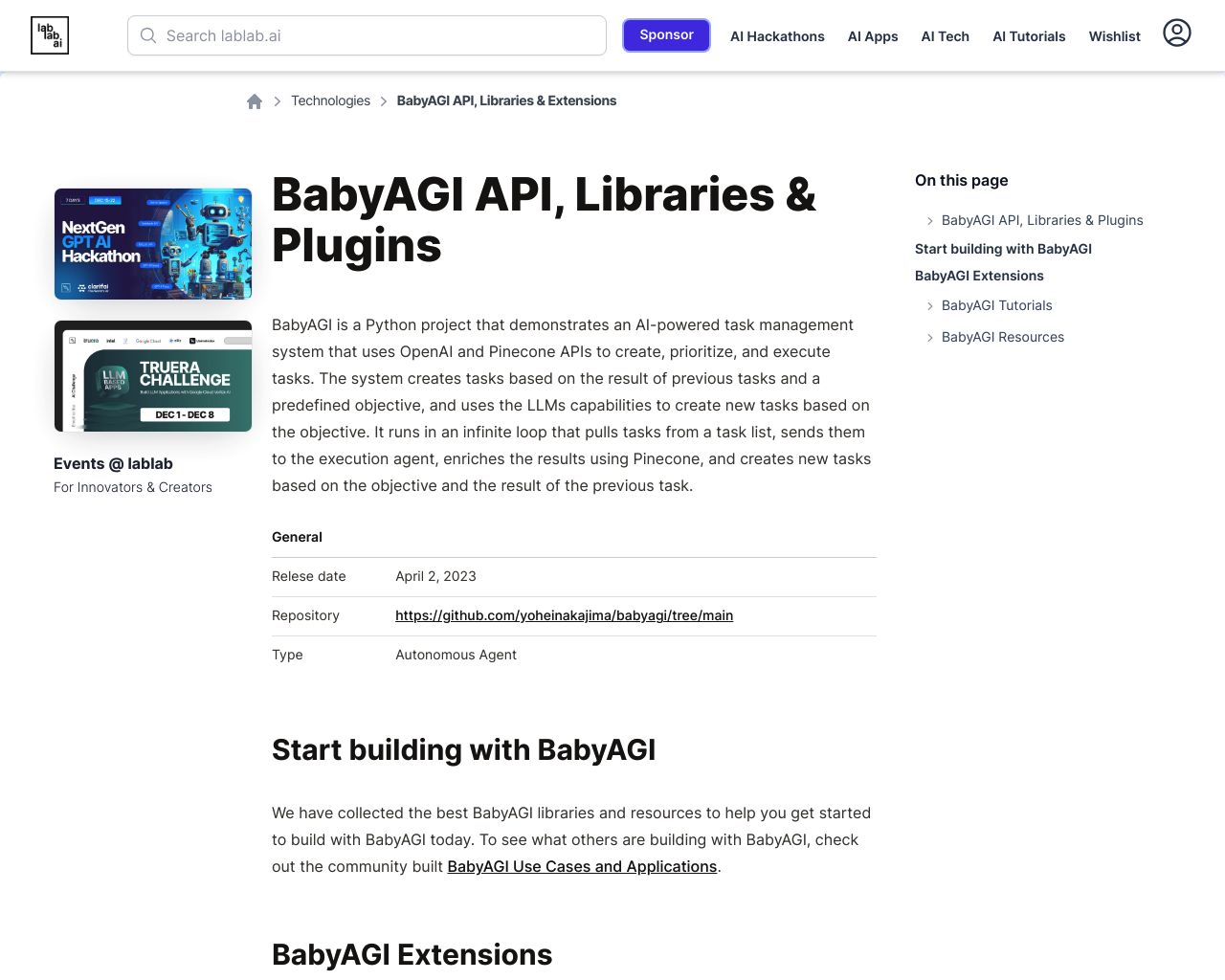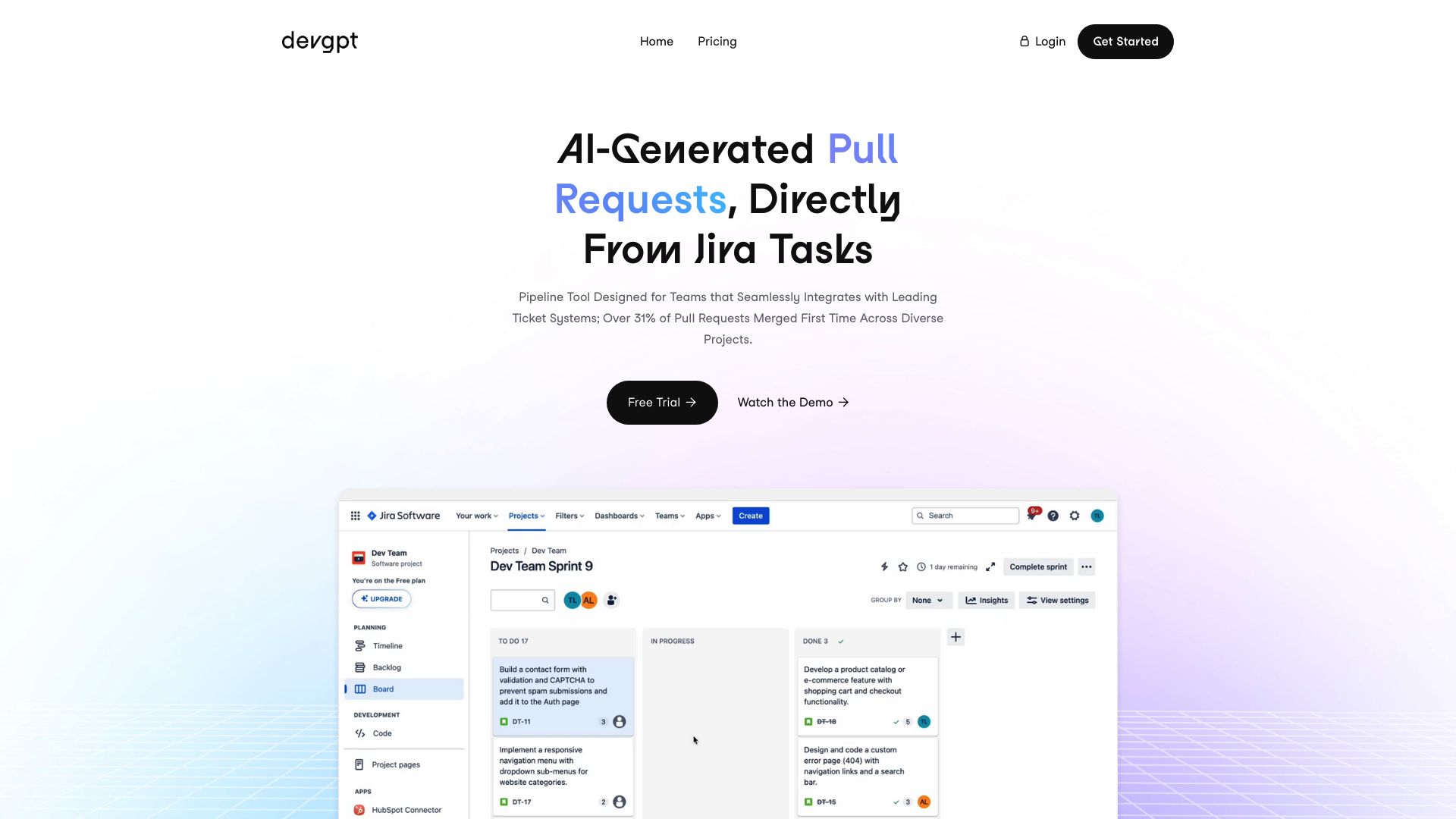BabyAGI vs. DevGPT: AI-Powered Task Management and Code Generation
AI-powered task management and code generation tools are reshaping how developers and businesses approach complex challenges. BabyAGI vs. DevGPT represent two innovative approaches in this space, each offering unique capabilities to streamline workflows and boost productivity.
BabyAGI focuses on autonomous task management, breaking down objectives into actionable subtasks, while DevGPT specializes in transforming natural language prompts into executable code. This comparison explores their key features, strengths, and limitations, contrasting them with SmythOS, a comprehensive AI development platform. By examining these tools, readers will gain insights into the current state of AI-assisted development and task management, helping them make informed decisions about which solution best fits their needs.
BabyAGI Overview
BabyAGI revolutionizes task management through artificial intelligence. This open-source project simulates human-like cognitive processes, autonomously generating, prioritizing, and executing tasks based on defined objectives.


Developed by Yohei Nakajima, BabyAGI employs advanced natural language processing and machine learning techniques to adapt and learn from previous tasks. This capability allows it to tackle complex problems across various fields, from healthcare to education. The system integrates OpenAI’s language models for processing and Pinecone for efficient storage and retrieval of task results.
BabyAGI’s strength lies in its task-driven autonomy and adaptability. It breaks down objectives into manageable subtasks, executes them, and iterates based on results.
BabyAGI’s strength lies in its task-driven autonomy and adaptability. It breaks down objectives into manageable subtasks, executes them, and iterates based on results. This approach enables BabyAGI to address intricate issues effectively, offering a glimpse into the future of artificial general intelligence.
While BabyAGI showcases impressive capabilities in autonomous task management, it has limitations. The platform lacks a visual builder or no-code editor, requiring users to have coding knowledge, particularly in Python. Additionally, BabyAGI does not offer specific features for multi-agent collaboration, human-AI interaction, or deployment options like APIs or webhooks.
Despite these constraints, BabyAGI represents a significant step towards more flexible and adaptive AI systems. Its ability to continuously learn and improve positions it as a valuable tool for researchers and developers pushing the boundaries of AI technology.
DevGPT Overview
DevGPT transforms natural language prompts into executable code, revolutionizing software development workflows. This AI-powered assistant automates repetitive coding tasks, allowing developers to focus on complex challenges.


DevGPT’s personalized training adapts to individual coding styles, ensuring generated code aligns with existing codebases. The platform integrates seamlessly with popular development tools like GitHub and Jira, streamlining the creation of pull requests from tasks or tickets. By leveraging advanced models such as GPT-4 and Codex, DevGPT delivers context-aware code snippets that accelerate development cycles.
DevGPT’s personalized training adapts to individual coding styles, ensuring generated code aligns with existing codebases.
The platform’s editable output feature empowers users to refine generated code through inline comments, fostering a collaborative approach between human developers and AI. This iterative process enhances code quality and maintains consistency with project standards. Early adopters report significant time savings, with some users gaining over 10 hours per week in productivity.
While DevGPT excels in code generation and task automation, it currently lacks some advanced features found in more comprehensive AI agent builders. The platform doesn’t offer hosted agents for development and production environments, nor does it provide a visual builder or no-code editor. These limitations may impact its suitability for teams seeking a complete AI development ecosystem.
DevGPT’s vision extends beyond individual developers to serving companies of all sizes. The platform aims to build an engaged community of users and contributors, driving future product development. As DevGPT evolves, it has the potential to become an indispensable AI-powered coding companion, reshaping how software teams approach development challenges.
Feature Comparison
BabyAGI and DevGPT offer distinct approaches to AI-driven task management and code generation. BabyAGI excels in autonomous task prioritization and execution, breaking down complex objectives into manageable subtasks. Its integration with Pinecone for vector storage enables effective context retention and task result retrieval. DevGPT, on the other hand, focuses on transforming natural language prompts into executable code, streamlining software development workflows.
While both platforms lack visual builders and no-code editors, they differ significantly in their core functionalities. BabyAGI’s strength lies in its ability to handle diverse tasks across multiple domains, adapting and learning from previous results. DevGPT specializes in code generation, offering personalized training that adapts to individual coding styles and seamless integration with development tools like GitHub and Jira.
Neither BabyAGI nor DevGPT provide robust security features or deployment options like hosted agents or API endpoints. This gap contrasts with SmythOS, which offers comprehensive security measures, including data encryption and OAuth integration, as well as flexible deployment options across various environments. SmythOS also stands out with its visual builder, no-code editor, and support for multi-agent collaboration, features absent in both BabyAGI and DevGPT.
Feature Comparison Table
| BabyAGI | DevGPT | SmythOS | |
|---|---|---|---|
| CORE FEATURES | |||
| Hosted Agents (Dev, Production) | ❌ | ❌ | ✅ |
| Environments (Dev, Production) | ❌ | ❌ | ✅ |
| Visual Builder | ❌ | ❌ | ✅ |
| No-Code Options | ❌ | ❌ | ✅ |
| Autonomous Agents | ✅ | ❌ | ✅ |
| Explainability & Transparency | ❌ | ❌ | ✅ |
| Multimodal | ✅ | ❌ | ✅ |
| Multi-Agent Collaboration | ✅ | ❌ | ✅ |
| Human-AI Interaction | ❌ | ✅ | ✅ |
| Audit Logs for Analytics | ❌ | ❌ | ✅ |
| Bulk Work | ✅ | ❌ | ✅ |
| Agent Work Scheduler | ❌ | ❌ | ✅ |
| Logs & Monitoring | ❌ | ❌ | ✅ |
| SECURITY | |||
| Constrained Alignment | ❌ | ❌ | ✅ |
| Data Encryption | ✅ | ❌ | ✅ |
| OAuth | ✅ | ❌ | ✅ |
| IP Control | ❌ | ❌ | ✅ |
| COMPONENTS | |||
| Foundation AIs | ❌ | ❌ | ✅ |
| Huggingface AIs | ✅ | ❌ | ✅ |
| Zapier APIs | ✅ | ❌ | ✅ |
| All other APIs, RPA | ✅ | ❌ | ✅ |
| Classifiers | ✅ | ❌ | ✅ |
| Logic | ✅ | ❌ | ✅ |
| Data Lakes | ❌ | ❌ | ✅ |
| DEPLOYMENT OPTIONS (EMBODIMENTS) | |||
| Deploy as API | ✅ | ❌ | ✅ |
| Deploy as Webhook | ✅ | ❌ | ✅ |
| Staging Domains | ❌ | ❌ | ✅ |
| Production Domains | ❌ | ❌ | ✅ |
| API Authentication (OAuth + Key) | ✅ | ❌ | ✅ |
| Deploy as Site Chat | ✅ | ❌ | ✅ |
| Deploy as Scheduled Agent | ❌ | ❌ | ✅ |
| Deploy as GPT | ✅ | ❌ | ✅ |
| Scalability | ✅ | ❌ | ✅ |
| DATA LAKE SUPPORT | |||
| Hosted Vector Database | ✅ | ❌ | ✅ |
| Sitemap Crawler | ❌ | ❌ | ✅ |
| YouTube Transcript Crawler | ❌ | ❌ | ✅ |
| URL Crawler | ✅ | ❌ | ✅ |
| PDF Support | ✅ | ❌ | ✅ |
| Word File Support | ✅ | ❌ | ✅ |
Best Alternative to BabyAGI and DevGPT
SmythOS stands out as the superior alternative to BabyAGI and DevGPT, offering a comprehensive AI agent development platform that combines power, flexibility, and ease of use. Our visual builder and no-code options democratize AI development, allowing users of all skill levels to create sophisticated agents without extensive programming knowledge.
Unlike BabyAGI and DevGPT, SmythOS provides a complete ecosystem for AI agent development and deployment. We offer hosted agents for both development and production environments, ensuring seamless scalability as your needs grow. Our platform supports multi-agent collaboration, enabling complex problem-solving capabilities that surpass the limitations of single-agent systems like BabyAGI.
SmythOS stands out as the superior alternative to BabyAGI and DevGPT, offering a comprehensive AI agent development platform that combines power, flexibility, and ease of use.
Security is paramount in AI development, and SmythOS excels where BabyAGI and DevGPT fall short. We implement robust data encryption, OAuth integration, and IP control features to protect your sensitive information and ensure compliance with industry standards. This comprehensive security approach makes SmythOS ideal for enterprise-level deployments and data-sensitive industries.
SmythOS’s versatility shines through its extensive integration options and deployment flexibility. We support a wide range of AI models, APIs, and data sources, including Hugging Face models, Zapier integrations, and various file formats. This allows for the creation of truly multimodal AI agents capable of handling diverse tasks across different domains. Whether you need to deploy your agent as an API, webhook, site chat, or scheduled task, SmythOS provides the tools to make it happen efficiently.
By choosing SmythOS, you’re not just selecting an AI agent builder; you’re embracing a future-proof platform that evolves with your needs. Our commitment to continuous improvement and user-centric design ensures that you’ll always have access to cutting-edge AI capabilities, wrapped in an intuitive interface that accelerates your development process and drives innovation across your organization.
Conclusion
BabyAGI and DevGPT offer unique approaches to AI-driven task management and code generation. BabyAGI excels in autonomous task prioritization and execution, while DevGPT focuses on transforming natural language prompts into executable code. However, both platforms lack crucial features for comprehensive AI development and deployment.
SmythOS emerges as the superior choice, offering a complete ecosystem for AI agent creation and management. Our platform’s visual builder and no-code editor empower users of all technical backgrounds to create sophisticated AI agents. We provide robust security measures, including data encryption and OAuth integration, ensuring your AI operations remain protected.
Unlike BabyAGI and DevGPT, SmythOS supports multi-agent collaboration and human-AI interaction, enabling complex problem-solving scenarios. Our platform’s versatility shines through its extensive integration ecosystem, connecting with over 300,000 services and APIs. This unparalleled flexibility allows you to seamlessly incorporate AI into existing workflows across various industries.
Experience the future of AI development with SmythOS. Create a free account today and unlock unlimited AI agent creation. Explore our diverse range of AI-powered agent templates to jumpstart your projects, or dive into our comprehensive documentation to harness the full potential of our platform. With SmythOS, you’ll revolutionize your approach to AI, driving innovation and efficiency across your organization.
Last updated:
Disclaimer: The information presented in this article is for general informational purposes only and is provided as is. While we strive to keep the content up-to-date and accurate, we make no representations or warranties of any kind, express or implied, about the completeness, accuracy, reliability, suitability, or availability of the information contained in this article.
Any reliance you place on such information is strictly at your own risk. We reserve the right to make additions, deletions, or modifications to the contents of this article at any time without prior notice.
In no event will we be liable for any loss or damage including without limitation, indirect or consequential loss or damage, or any loss or damage whatsoever arising from loss of data, profits, or any other loss not specified herein arising out of, or in connection with, the use of this article.
Despite our best efforts, this article may contain oversights, errors, or omissions. If you notice any inaccuracies or have concerns about the content, please report them through our content feedback form. Your input helps us maintain the quality and reliability of our information.
